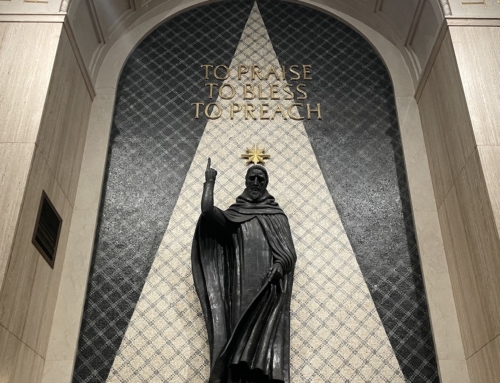I once heard it suggested that there’s a sort of joke hidden in the Latin original of the Summa Theologiae that didn’t make it into the commonly used English translation: “the proof from authority is the weakest form of proof,” we read in the Benziger edition (I.1.8.2us), and yet we don’t see the words that follow in the Latin text: “secundum Boëtium.” In the original Latin, you see, Thomas argues that the argument from authority is the weakest form of argument on the basis of the authority of Boethius.
While we may certainly savor the irony, two things should be pointed out so as to grasp the real meaning of this assertion. First, although in human affairs the argument from authority is the weakest form of argument, it is still an argument; that is, the testimony of authorities can be of great assistance in our quest for truth, as we attempt to use our reason to distinguish truth from error. Further, although in matters of human reason the argument from authority is the weakest, when we are dealing with matters of divine revelation (to which no one can reason unless he is God), the argument from authority based on divine revelation is the strongest form of argument.
In the Christian tradition, there has been a balanced appreciation both of the value of authority as well as of the fact that the truth transcends the person who speaks. As Pope Benedict recently tweeted, “We do not possess the truth, the truth possesses us.” We can glean truth from anyone who speaks it, whether they are an authority or not. In matters of faith, persons endowed with the charism of proclaiming the truth about Jesus Christ possess a unique authority as ministers of Christ, and yet they too are servants of the truth, they too have learned the message they proclaim from Christ and not from their own ingenuity.
Nevertheless, when it comes to convincing people of the truth, whether it be about matters of faith or matters of reason, it can sometimes be helpful to omit an explicit mention of the source of our argument or reasoning. The reason for this is that for some people, the authorities in question or even authority in itself is suspect. If we have decided, for instance, that Christians are naïve and outdated, then we will not be inclined to grant a particular Christian authority a fair hearing nor see that person as a helpful guide on our quest for truth.
In the past, it has often been necessary to remind Christians that unexpected sources may be able to offer insight into the truth. In the earliest days of the evangelization of Europe, some were inclined to question the helpfulness of the pagan philosophical traditions. “What has Athens to do with Jerusalem?” was the skeptical cry. Acting under the auspices of divine providence, however, Christians were able to recognize that any truth possessed by non-Christians could be plundered for the sake of the Gospel like the gold of the Egyptians (cf. Ex 12:35-36).
In the late 6th century, St. Martin of Braga formulated a phrase which summarized this tradition: “Do not let the authority of a speaker move you, consider what is said, not who says it.” (Ironically, the text containing this admonition circulated under the putative authorship of Seneca, presumably enhancing its authority.) In a famous text on study spuriously attributed to Thomas Aquinas (and yet surely expressing something true about his mindset), a similar sentiment is expressed: “Do not consider who the person is you are listening to, but whatever good he says commit to memory.” To adduce another authority, The Imitation of Christ likewise joins this chorus: “Inquire not who may have said a thing, but consider what is said.”
In this context, it is interesting to consider St. Thomas’s treatment in his commentary on the Letter to the Hebrews about the question of whether Paul himself had written the epistle. Observing that there is no mention of the name of the author in the epistle itself, Thomas suggests that Paul may have written anonymously “because his name was odious to the Jews, since he taught that the observances of the law were no longer to be kept, as is clear from Acts 15:2. Consequently, he concealed his name, lest the salutary doctrine of this epistle go for naught.” Paul, in other words, was for this particular audience an anti-authority, a shady character; nevertheless, because his message was so important, he willingly effaced his own authority so as to enable his message to have a fair hearing.
Today, ironically, it is often necessary to remind not Christians but rather non-Christians that they should consider the testimony of those who do not share their perspective. Christians, despite everything, may have insights into the truth that may be worthy of their consideration. In other words, do not let the anti-authority of the speaker move you, but consider what is said, not who says it. If the truth really is at stake, it will ultimately prevail.
✠
John William Waterhouse, The Remorse of Nero







